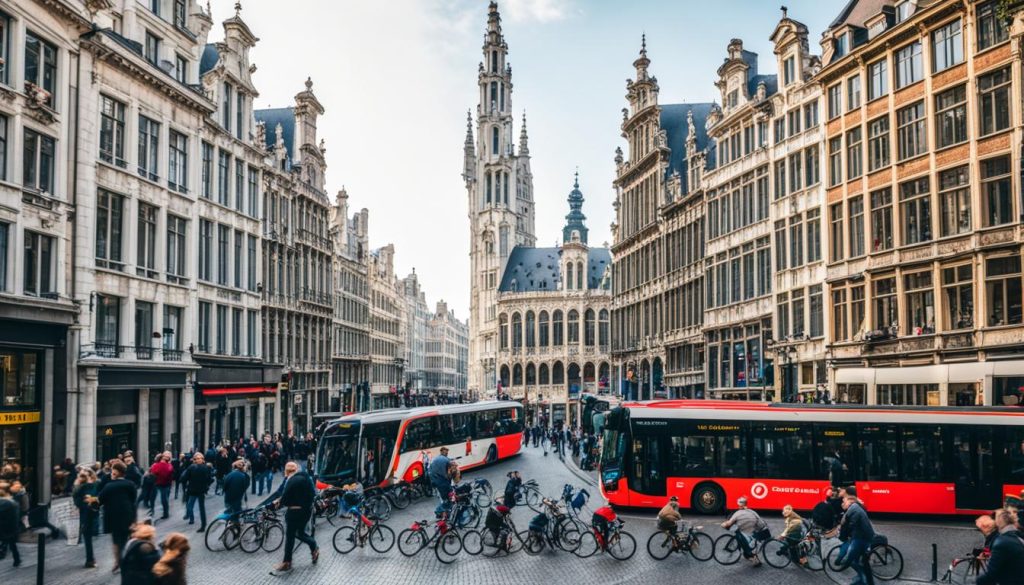Belgium is right at the heart of Europe and is a vibrant country. It provides a special chance for people to really live its work life and culture. Recently, it started a four-day workweek, leading the way in the EU. This change means workers can enjoy more flexibility and a better balance between work and personal life.
In Belgium, work-life balance and the well-being of employees are very important. They’ve introduced the four-day workweek to show how much they care about this. Now, workers can pick either to work longer hours across four days or shorter hours across five. But, the total hours worked are still the same. This new rule aims to make the economy more active and make the job market more flexible.
Belgium isn’t just about work, it’s a place where you can have a great life. The country is famous for its long and interesting past, its many different foods, and beautiful buildings. There’s so much to do, from walking around Brussels to seeing the lovely town of Bruges. Belgium is all about enjoying both work and fun times.
Key Takeaways
- Belgium offers a four-day workweek, providing workers with flexibility and a better work-life balance.
- The Belgian work culture emphasizes work-life balance and employee well-being.
- Belgium is known for its rich history, diverse cuisine, and stunning architecture.
- The country offers a vibrant lifestyle that seamlessly blends work and leisure.
- Workers in Belgium can enjoy a fulfilling work experience and a high quality of life.
The Four-Day Workweek in Belgium
Belgium is trying something different with a four-day workweek. They let workers pick between two options. One is to work nine and a half hours a day for four days. The other lets them stick to eight-hour days but work for five days. This means the amount of work done in a week is the same, but they get longer weekends.
The goal of this change is to make the job market more flexible and foster new ideas. By giving staff choices, the government hopes to make the work world more lively and help the economy grow.
Yet, not everyone is thrilled with the idea. Some worry that having longer workdays might lead to more stress or put too much on their plate. Before companies make the switch, they should really think about the pros and cons.
| Belgian Four-Day Workweek | Four-Day Workweek Trials | Workweek Options |
|---|---|---|
| Workers choose between working nine and a half hours a day over four days or eight hours a day over five days. | Typically, employees work fewer hours for the same amount of pay. | Provides flexibility and options for workers while maintaining the same total number of work hours. |
| Government initiative to create a more flexible and innovative labor market. | Trials conducted in various countries to explore the benefits and challenges of the shortened workweek. | Allows workers to choose the working pattern that suits their preferences and needs. |
| Mixed reactions from employers and employees, with concerns about potential organizational issues and increased workloads. | Varied responses from businesses and workers, depending on the industry and work culture. | Requires careful consideration and adaptation to ensure a smooth transition and implementation. |
Work Opportunities in Belgium
Belgium is well-known for its varied work opportunities in many different fields. This makes it a top pick for those looking for jobs. The job scene here is tough but rewarding, across various sectors.
Popular Industries in Belgium
In Belgium, there are lots of jobs in services and high-tech industries, particularly in Flanders. The south specialises in manufacturing. The public sector attracts those seeking stability with its many opportunities. Key industries here include:
- Banking and Finance, with top banks and financial firms for jobs in money matters.
- Law, offering roles for legal experts in different law branches.
- Media and Communication, powering a lively media space with TV, radio, and publishing.
- Retail, filling jobs from sales to management.
- Tourism, flourishing thanks to Belgium’s culture and cities, with many hospitality and tourism jobs.
- Transportation, a vital part of Europe’s heart, thus packed with logistics and transport roles.
Popular Graduate Jobs in Belgium
Belgium is a great place for new grads with a bunch of exciting areas to start their careers. Common options for fresh graduates are:
- Engineering, including civil, mechanical, electrical engineering, and automation.
- Pharmaceuticals, with jobs for scientists, pharmacists, and sales reps.
- Processed Food and Beverages, offering roles in food production and quality.
- Transportation Equipment, featuring jobs in making vehicles and bikes.
- Textiles, known for careers in fashion design and production.
| Industry | Main Companies |
|---|---|
| Banking and Finance | ING Belgium, BNP Paribas Fortis, KBC Bank |
| Law | Allen & Overy Belgium, Stibbe, Liedekerke Wolters Waelbroeck Kirkpatrick |
| Media and Communication | VRT, Mediahuis, DPG Media |
| Retail | Delhaize, Colruyt Group, Carrefour Belgium |
| Tourism | Visit Brussels, Visit Flanders, Wallonia Belgium Tourism |
| Transportation | Brussels Airport, Port of Antwerp, SNCB |
Major Employers in Belgium
Belgium has many top employers in different fields. These companies are vital for the country’s economy. They also offer jobs to people with various skills.
Insurance Sector
Ageas stands out in the insurance market of Belgium. The company’s main office is in Brussels. It covers international areas and serves a wide variety of insurance needs.
Brewing Industry
Anheuser-Busch InBev is the world’s biggest brewing company. With famous brands like Stella Artois and Budweiser, it is a big part of Belgium. It’s known worldwide for its quality beers.
Steel Wires
Bekaert leads in turning steel wire into useful products. It works with cars, buildings, energy, and farming. Based in Belgium, it’s a key player across the globe.
Banking Sector
Banque Nationale de Belgique is Belgium’s central bank. It helps set the country’s money policy and keep the finance world stable. This bank keeps an eye on other banks to make sure things run well.
KBC Bank significantly impacts banking in Belgium. It provides needed financial services to people, companies, and big businesses. This helps make the economy better and stronger.
Food Retail
Colruyt Group is a top choice for food shopping in Belgium. Their stores are all over the country. They aim to give their customers the best products and service.
Vehicle Distribution
D’Ieteren handles getting different car brands to the customers. They also offer services like leasing and car upkeep. They help keep Belgium moving.
Energy
Elia manages the electricity lines in Belgium. It’s key in making sure electricity is always available. This is important for homes, companies, and factories.
Telecommunications
Proximus is the leading name in phones and internet in Belgium. It connects people and businesses with its telecom services all over the country.
Chemicals
Solvay is at the forefront of making chemicals and advanced materials. Working in various areas such as air travel, cars, health, and energy, it drives innovation forward.
Biopharmaceuticals
UCB works on life-changing medicines for serious illnesses. They focus on the brain, the immune system, and bone health. Their work helps improve health globally.
Materials Technology
Umicore focuses on making materials and technologies that are good for the earth. They work in cars, clean energy, recycling, and electronics. Their work supports a greener future.
| Industry | Company |
|---|---|
| Insurance | Ageas |
| Brewing | Anheuser-Busch InBev |
| Steel Wires | Bekaert |
| Banking | Banque Nationale de Belgique |
| Banking | KBC Bank |
| Food Retail | Colruyt Group |
| Vehicle Distribution | D’Ieteren |
| Energy | Elia |
| Telecommunications | Proximus |
| Chemicals | Solvay |
| Biopharmaceuticals | UCB |
| Materials Technology | Umicore |
Skills in Demand in Belgium
Belgium has lots of jobs for skilled people in many sectors. If you’re from abroad, it’s not hard to find work here. The country needs people in roles like accounting, IT, and teaching.
- Accounting
- Administration
- Architecture
- Electrical work
- Engineering
- IT
- Nursing
- Project management
- Teaching
- Sales
If you like a job that’s both tough and fulfilling, Belgium’s the place. They want specialists in fields like finance and healthcare. Lots of chances are out there for the right person.
Let’s look at what’s needed in Belgium with this table:
| Sectors | Skills in Demand | Job Shortages |
|---|---|---|
| Accounting | Financial analysis, auditing, taxation | High demand for accountants |
| Administration | Office management, project coordination | Shortage of administrative professionals |
| Architecture | Architectural design, project management | Lack of qualified architects |
| Electrical work | Electrical installation, maintenance | Shortage of skilled electricians |
| Engineering | Mechanical, civil, electrical engineering | High demand for engineers in various disciplines |
| IT | Software development, cybersecurity, data analysis | Lack of IT professionals |
| Nursing | General nursing, specialized nursing | Shortage of nurses in healthcare facilities |
| Project management | Project planning, execution, communication | High demand for skilled project managers |
| Teaching | Primary, secondary, higher education teaching | Shortage of qualified teachers |
| Sales | Sales strategy, relationship building | Lack of sales professionals |
Finding a Job in Belgium
Looking for job chances in Belgium is quite like in the UK. To get going, craft a good CV, a strong cover letter, and collect your references. These are key to showing off what you can do to potential bosses.
Remember language needs when you apply for jobs in Belgium. The needed language can be Dutch, French, or German, depending on where you apply. Using the right language shows you care about local ways and boosts your chance of job success.
For those from outside the EU, getting a job offer is vital to work in Belgium. This means finding a job before you show up is a must. One way to do this is by contacting agencies that help place workers in Belgium. These folks link you with possible job openings through their contacts.
Also, Belgium’s regions have their own job centres with help for job seekers. These places offer advice on improving your job apps, tips for interviews, and put you in touch with employers looking for new workers.
Summer Jobs and Teaching Opportunities
In the summer months, Belgium buzzes with job opportunities. This is especially true in the tourism sector. Students and young professionals can land rewarding jobs in places like hotels. These jobs not only give a taste of the work life but also a chance to meet people from around the world. Plus, you get to boost your bank balance.
Belgium isn’t just about summer jobs though. It’s a hotspot for teaching too, English teaching to be exact. Thanks to its mix of cultures, teaching English is a sought-after gig. If you have a TEFL certification, even better. Websites like ESL Base and TEFL.com are goldmines for finding these jobs. They link teachers with schools and language centres all over Belgium.
The British Council also runs a cool scheme. The Language Assistant Programme lets you lend a hand in schools and colleges. This opportunity can really make you part of Belgian life, helping break down cultural barriers.
Summer Job Opportunities in Belgium
| Job Sector | Job Roles | Requirements |
|---|---|---|
| Hospitality | Waitstaff, bartenders, hotel staff, tour guides | Fluency in English, good customer service skills |
| Tourism | Tour operators, travel agents, visitor center staff | Knowledge of local attractions, proficiency in multiple languages |
| Education | TEFL teachers, language assistants | TEFL certification, proficiency in English |
Working in Belgium, be it in a job or as a teacher, is a journey. It’s about diving into a blend of cultures. It’s a great chance to learn new skills and make friends. And let’s not forget, it’s an awesome way to see the country and earn a bit too.
Internships in Belgium
Belgium has lots of internship chances. They offer a big step towards a great career. Whether you’ve just graduated or want to learn more, internships in Belgium give you a foot in the door.
International Organizations and Professional Firms
- At Deloitte, interns in Belgium get real-world experience in audit, tax, and more. It’s a great step for students and grads.
- PwC helps students and young pros gain experience in accounting and consulting. Their internships are perfect for learning on the job.
Traineeships and Summer Placements
- AIESEC UK connects young people with internships in Belgium. These internships help you build skills in your area of study.
- IAESTE UK lets students work internationally. In Belgium, you can find internships in engineering, business, and more through IAESTE.
Turing Scheme
The UK’s Turing Scheme opens doors for students and recent grads. In Belgium, you can intern in many different fields. It’s a great chance to get international work experience.
Internships in Belgium boost your CV. They help you meet people, learn valuable skills, and understand how Belgians work.
Belgian Visas and Language Requirements
Thinking about moving to Belgium? You should know about the visa and work permit rules, especially if you’re from the UK or elsewhere outside the EU. It’s important to understand how to maneuver through Belgium’s immigration requirements.
For visits under 90 days, you need a short-term visa. This is good for tourism or quick business trips. Or, if you want to stay and work longer, you’ll need a different visa, including a work permit.
Work permits in Belgium
Long-term stays in Belgium often mean needing a work permit. You can’t work legally there without the right documents. Work permits are given for a specific job you’ve been offered.
If you’re from an EU country, getting a work permit might be easier. But for those from outside the EU, like the UK post-Brexit, it’s more complicated. You’ll have to follow special rules to get permission to work.
Language requirements in Belgium
Belgium uses Dutch, French, and German as its main languages. The language you need to know depends on where you live or work. For example, Dutch is required in Flanders, while French is used in Wallonia.
Knowing one of Belgium’s languages helps a lot. It makes daily life easier and improves your chances of getting a job and fitting in. Sometimes, you must speak the local language well for certain jobs.
Even though some jobs allow you to just speak English, learning the local languages opens more doors. This is especially true in jobs where talking to customers or locals is key.
The Working Week and Benefits in Belgium
In Belgium, employees work an average of 38 hours each week. This amount of work creates a good balance between work and personal life. It gives them plenty of time for hobbies and spending time with their families. Workers also get paid holidays based on their work from the year before. This allows them to relax, enjoy time off with family, and see Belgium’s beautiful places.
Belgium has ten public holidays a year. During these days, workers can have even more time off to celebrate or rest. Important holidays include New Year’s Day, Easter Monday, and Christmas. They are key times for people to unwind and do things they love.
Working in Belgium comes with perks like paid holidays and leave. But, it’s important to know living there can be expensive. Though, the high quality of life and the support of the welfare system might balance this out. Also, the country has high income tax rates. Yet, they help build strong public services and make the country better.
| Benefits of Working in Belgium | Considerations |
|---|---|
| Paid annual leave based on previous year’s work | High cost of living |
| Ten public holidays | High income tax rates |
| Good work-life balance |
Management Culture in Belgium
In Belgium, management usually works from top to bottom like in France. But things are changing. They are moving towards a more open way, taking after the Dutch style.
Now, tasks and responsibilities are shared more. And employees get a bigger say in making decisions. This lets them feel more involved.
Belgian work life focuses on working together as a team. Managers ask for ideas and thoughts from their team members. This makes everyone feel more in control and valued.
When it comes to making choices in companies in Belgium, everyone’s view is considered. That way, decisions are fair and everyone’s perspective is valued. This approach strengthens how well everyone works together.
Things are changing in how Belgium manages work. Now, they are all about sharing decisions with everyone involved. This shows their value for working as a team and respecting everyone’s ideas.
| Traditional Belgian Management Culture | Evolving Belgian Management Culture |
|---|---|
| Top-down approach | Open and participatory approach |
| Decisions made by managers | Delegation and employee involvement |
| Less focus on employee input | Seeking input and feedback from employees |
| Centralized decision-making | Consensus-building and collaboration |
Studying in Belgium
Belgium is a top study spot with many courses and degrees to choose from. Its educational system is rich and diverse. Students get to learn and live in a multicultural environment.
Education System in Belgium
Belgium’s education is famed for quality and innovation. It has three language groups for learning: Dutch, French, and German. Each group runs its education with its unique curriculum and language of teaching.
In Flanders, Dutch-speaking areas, we find universities like Leuven and Antwerp. These are well-known for their academics. They offer a range of subjects.
French-speaking regions have schools such as the University of Liège. Here, teaching is mainly in French.
The smaller German-speaking group also has universities, like the University of Liège Faculty of Medicine.
Belgium is proud of having many international study spots, too. They offer courses in English. This attracts students worldwide.
Interaction between universities and the job market is strong in Belgium. It helps students get practical skills for work.
Study Opportunities and Scholarships
Belgium invites students worldwide for various study programs. You can aim for a bachelor’s, master’s, or Ph.D. Many choices await you.
Apply directly or via platforms like the Study in Flanders website. Make sure to know each place’s entry needs and deadlines.
Financial support is also available. For example, there are scholarships from the Belgian Government and Erasmus. Many students can find help paying for their studies.
Student Life in Belgium
For students, life in Belgium is exciting and fulfilling. Its cities are lively and culturally rich.
Students can enjoy great food and visit historic places. There are always fun cultural events to join.
Belgium’s middle-Europe location makes it easy to travel around. This means lots of opportunities for adventure.
Top Universities in Belgium
| University | Location | Language of Instruction |
|---|---|---|
| University of Leuven | Leuven | Dutch, English |
| Ghent University | Ghent | Dutch, English |
| University of Brussels | Brussels | French, Dutch, English |
| University of Liège | Liège | French, English |
| Antwerp University | Antwerp | Dutch, English |
These universities are loved for their education quality. They offer many courses in different subjects.
Conclusion
In short, working in Belgium is special and rewarding. The nation’s unique four-day workweek policy is a game-changer. It lets workers balance job and life better. People can freely pick when they work, supported by plenty of paid leave.
Belgium is full of chances across many fields. Job seekers can dive into technology, manufacturing, and finance. Success is there for those with the skills. Its cultural mix adds to work life, making it vibrant.
Yet, knowing the local languages and high prices is key. Being fluent in Dutch, French, or German helps a lot. It opens doors and connects you to people. Also, thinking about the expenses and budgeting is wise.
To sum up, Belgium is great for combining work and life well. There are lots of jobs and a unique culture to enjoy. With the right attitude and skills, people can do really well here.
FAQ
Q: What is the four-day workweek in Belgium?
Q: How is the Belgian four-day workweek different from other trials?
Q: What are the job opportunities in Belgium?
Q: Which are the major employers in Belgium?
Q: What skills are in demand in Belgium?
Q: How can I find a job in Belgium?
Q: Are there summer jobs and teaching opportunities in Belgium?
Q: Are there internships available in Belgium?
Q: What are the visa and language requirements for working in Belgium?
Q: What is the working week and benefits in Belgium?
Q: What is the management culture in Belgium?
Q: Can I study in Belgium?
Source Links
- https://www.euronews.com/next/2022/11/21/workers-in-belgium-can-now-switch-to-a-four-day-week-but-they-wont-be-working-fewer-hours
- https://www.prospects.ac.uk/jobs-and-work-experience/working-abroad/work-in-belgium
- http://employment.belgium.be/en/themes/international/posting/working-conditions-be-respected-case-posting-belgium/working-time-and













